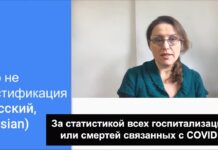After long last, I am making videos again. Below you have a video in Italian and a blog post in English and link to the original Italian article I wrote.
VIDEO:
I made this video “I was a child refugee” in Italian (with English and Italian subtitles) to bring attention to the plight of migrants around the world. I was a child refugee in Italy and feel deep empathy for the migrants arriving now in Europe.
[embedyt] https://www.youtube.com/watch?v=nfMvKEZbUrw[/embedyt]
ARTICLE:
Below is the English translation of my Italian article Io, ex bimba rifugiata (I was a child refugee) published on the Metro News Italy website on 29 August 2018.
My point of view is that of a three year old girl who arrived as a refugee in the beautiful country of Italy, but also that of an adult who understands the political, economic and social difficulties related to welcoming so many migrants in Italy. My family and I are deeply grateful to the Italian State and to the Italian people for the reception received during our stay in Italy, when we were stateless while awaiting our visas for the United States in 1980.
It is important to see the migrant crisis through the eyes of migrants and Italian citizens. Let’s analyze the situation via two perspectives, the past and present, and the sentimental and the rational.
I was 3 years old when the train escorted by armed guards full of Soviet refugees arrived in Rome. In the 1970s and 1980s, refugees from the former Soviet Union waited in Rome for their visas for the United States and Canada. My parents felt comfortable in Italy and appreciated the friendliness of Italians.
Our short stay in Italy was organized and financed by immigration organizations and, above all, was authorized by the Italian State. There weren’t as many Soviet migrants as the amount of migrants who arrive today in boats from Africa. But like the current migrants, we were refugees, with little money and we were considered traitors to the former Soviet Union with no possibility of return. Some of the migrants who arrive now in Italy can not return to their countries for religious, economic and political reasons and wars. When migrants are of another color, religion and culture, it is easier not to feel empathy for them. But we must try to empathize with and understand the emotions of these migrants. I share my experiences as a refugee in Italy to explain how I see the migrant crisis from the points of view of the past and the present.
I feel empathy for the migrants because I see myself in their eyes.
Present:
I see a photograph of a migrant on the street in Europe selling something.
Past:
I think of my father, an engineer who went by metro from Ostia to Roma Termini to the open flea market to sell Soviet linen.
In 2003, I returned to Ostia with my parents as tourists. We saw graffiti in the subway station with the words “Immigrants Go Away, B4P”. I wondered how my father would have felt at the sight of so much xenophobia and hate, when he was only trying to earn something to feed us while we were in Ostia. It was sad to remember that those fleeing towards safer shores are so little tolerated or wanted. Foreigners living in Ostia have probably experienced wars and socio-economic tensions and only seek a better life.
Present:
I see a video or a photograph of a family waiting for food in a refugee camp or a detention center.
Past:
I see myself in Ostia. I reach out to take my mom’ hand behind a truck that distributes food to Soviet migrants. I am happy to receive a delicious strawberry yogurt. (Until now I have not found a strawberry yogurt as good as the Italian one I loved as a child in Ostia.)
Present:
I see humanitarian organizations that help migrants when they arrive in Italy with the boats.
Past:
I remember the Mormon Mission in Ostia, next to our apartment, which gave cookies to Soviet children and who drove my family by car to the airport when we left for the United States.
Present:
I was in Greece and Serbia for a project to help refugees , I listened to the sad stories of refugees who had risked their lives to escape the wars in Afghanistan and Syria, the violence in Iraq, the political repression in Iran and from other situations in other countries. The refugees talked about people they saw drown in the Mediterranean Sea between Turkey and Greece and their relatives who were decapitated in Afghanistan by the Taliban.
Past:
Seeing the tired and frightened faces of the Balkan refugees, I felt the fear of my parents when we left the Soviet Union. The Soviet government punished our relatives who remained in the Soviet Union because we were traitors to the Communist paradise when we left for the US. The KGB bugged the phones of some of our relatives. My aunt lost her job and was barred from working for five years. I know that today’s migrants are worried about their families left in their respective countries.
Economy
I understand that, despite the empathy needed towards migrants, there is an economic crisis in Italy and it is very difficult for Italy to welcome so many migrants when some Italians struggle to make ends meet. I know that some people in my age group are in “the lost generation” and that many young people do not have jobs and some leave the country. I know it is not right that the European Union does not do enough to help Greece, Italy and other countries feed, clothe, house, protect and process migrants. Surely the Italian economy can not integrate all those who arrive. Italy is a country of passage, as it was for my family.
However, there is still a need to feel empathy for today’s migrants. Let’s look back at Italian history. Just think of your grandparents’ and great-grandparents’ generations to understand the need to escape from one’s country. In the last 100 years or more, there were many ships that departed from Italy for the United States, Argentina, Brazil and other countries when there was was poverty, war and political instability in Italy. Those waves of Italian immigration helped other countries to grow.
Migrants arriving now from Africa can be a resource for Italy. I realize that it is a great cost for the Italian state to have to support the education of many migrant children. These children can become future traders, professors and cultural ambassadors to promote the Italian language, culture and economy, both in Italy and in other countries.
Try to imagine the impact of the spread of Italian with thousands of migrants learning your language. I learned Italian as an adult. Three months ago, I was very happy to find an Italian bookstore in San Francisco. I had come in with my nephew and niece and showed them my favorite Italian books: Antonio Tabucchi’s Pereira Maintains and A Fortune Teller Told Me by Tiziano Terzani. Maybe one day, my niece and nephew will also fall in love with the beautiful Italian language. I spent money when I returned to Italy six times as a tourist. For one year, I sold Italian wines in California. I made videos on YouTube in Italian where I talked about how to learn other languages and explained the vision problems experienced by people who have crossed eyes, amblyopia and other binocular vision disorders. In short, I have contributed to the economy, education and public health of Italy, even from California. I believe that by learning the Italian language and by participating in integration programs, current migrants can help grow the Italian economy, both in Italy and abroad.
In the United States, we have a crisis on the border with Mexico where migrant parents are separated from their children and live in prison-like conditions. I am writing to my legislative representatives in the United States to bring families together and respect international rules for the rights of migrants and asylum seekers.
I do not have a perfect solution, but I beg you to be empathetic and not to reject the migrant boats. Unfortunately, some migrants commit small crimes. But the majority are not parasites, they are just people looking for a better life. When you see the migrants arriving after a risky journey at sea, try to think that that person could be you or one of your grandparents when they left Italy. We need to think both from the points of view of the past and the present and with the brain and the heart.












